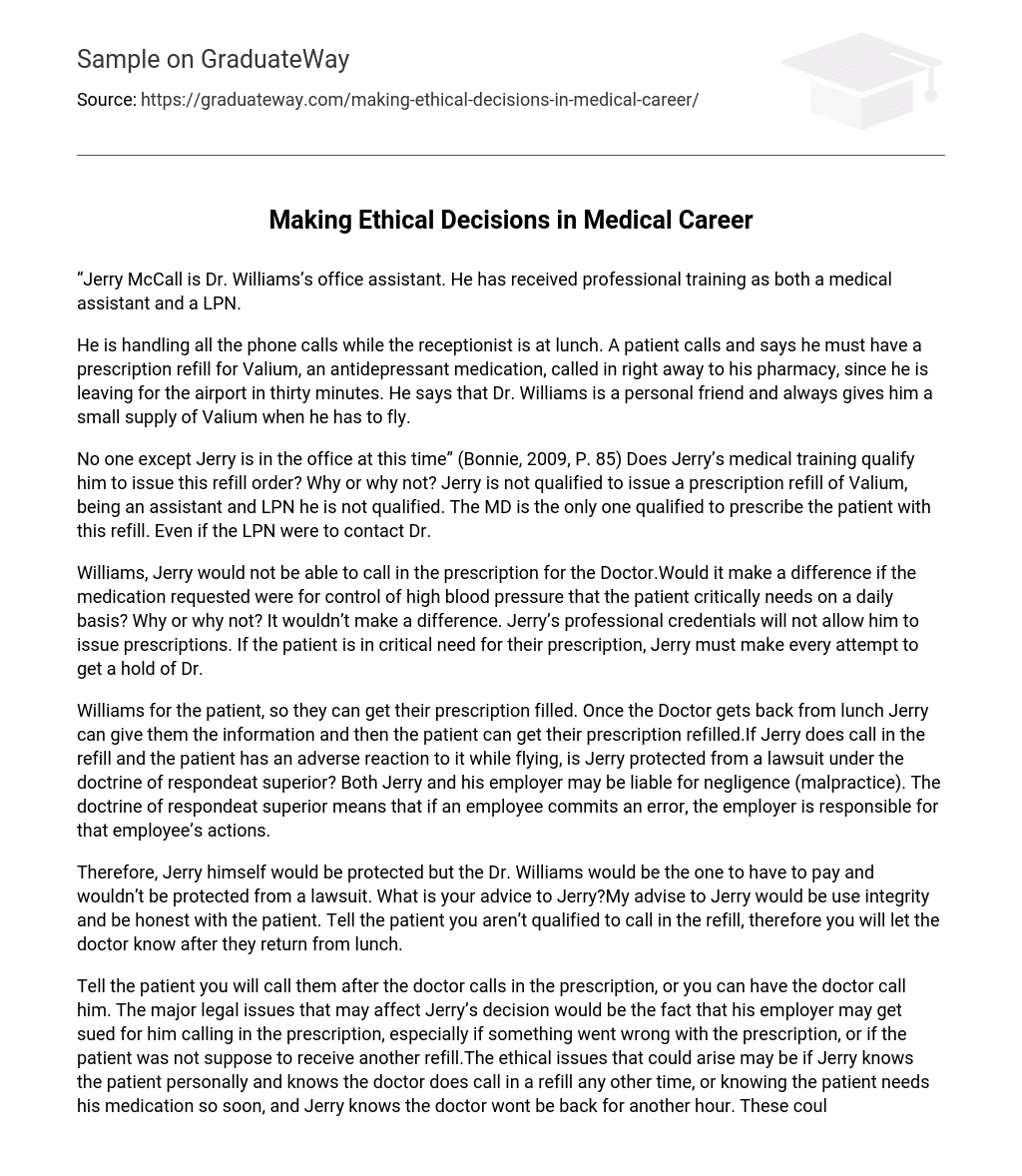“Jerry McCall is Dr. Williams’s office assistant. He has received professional training as both a medical assistant and a LPN.
He is handling all the phone calls while the receptionist is at lunch. A patient calls and says he must have a prescription refill for Valium, an antidepressant medication, called in right away to his pharmacy, since he is leaving for the airport in thirty minutes. He says that Dr. Williams is a personal friend and always gives him a small supply of Valium when he has to fly.
No one except Jerry is in the office at this time” (Bonnie, 2009, P. 85) Does Jerry’s medical training qualify him to issue this refill order? Why or why not? Jerry is not qualified to issue a prescription refill of Valium, being an assistant and LPN he is not qualified. The MD is the only one qualified to prescribe the patient with this refill. Even if the LPN were to contact Dr.
Williams, Jerry would not be able to call in the prescription for the Doctor.Would it make a difference if the medication requested were for control of high blood pressure that the patient critically needs on a daily basis? Why or why not? It wouldn’t make a difference. Jerry’s professional credentials will not allow him to issue prescriptions. If the patient is in critical need for their prescription, Jerry must make every attempt to get a hold of Dr.
Williams for the patient, so they can get their prescription filled. Once the Doctor gets back from lunch Jerry can give them the information and then the patient can get their prescription refilled.If Jerry does call in the refill and the patient has an adverse reaction to it while flying, is Jerry protected from a lawsuit under the doctrine of respondeat superior? Both Jerry and his employer may be liable for negligence (malpractice). The doctrine of respondeat superior means that if an employee commits an error, the employer is responsible for that employee’s actions.
Therefore, Jerry himself would be protected but the Dr. Williams would be the one to have to pay and wouldn’t be protected from a lawsuit. What is your advice to Jerry?My advise to Jerry would be use integrity and be honest with the patient. Tell the patient you aren’t qualified to call in the refill, therefore you will let the doctor know after they return from lunch.
Tell the patient you will call them after the doctor calls in the prescription, or you can have the doctor call him. The major legal issues that may affect Jerry’s decision would be the fact that his employer may get sued for him calling in the prescription, especially if something went wrong with the prescription, or if the patient was not suppose to receive another refill.The ethical issues that could arise may be if Jerry knows the patient personally and knows the doctor does call in a refill any other time, or knowing the patient needs his medication so soon, and Jerry knows the doctor wont be back for another hour. These could all affect his decision.
The problem solving methods that might be helpful to assist Jerry in making an ethical decision would be to establish trust with the patient and become aware of the problem. Then analyze the problems and decide on a plan with the patient.He will then want to make sure he reinforces the commitment to the patient and activate the plan. Last, he will follow through with the task and monitor everything until the situation is taken care of.
In conclusion, “Jerry McCall is Dr. Williams’s office assistant. He has received professional training as both a medical assistant and a LPN. He is handling all the phone calls while the receptionist is at lunch.
A patient calls and says he must have a prescription refill for Valium, an antidepressant medication, called in right away to his pharmacy, since he is leaving for the airport in thirty minutes.He says that Dr. Williams is a personal friend and always gives him a small supply of Valium when he has to fly. No one except Jerry is in the office at this time” (Bonnie, 2009, P.
85) In this essay I have explained why Jerry is not qualified to call in the refill for the patient and the different reasons behind why he shouldn’t. I also explained the problem solving methods that may help him to make an ethical decision when deciding on whether or not to call in the prescription for the patient.





